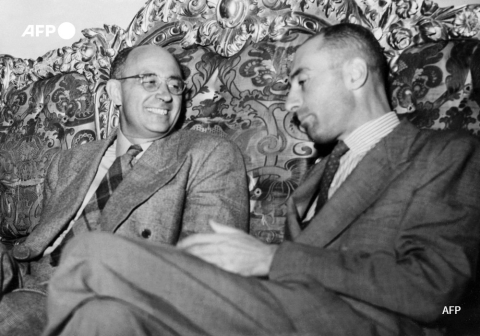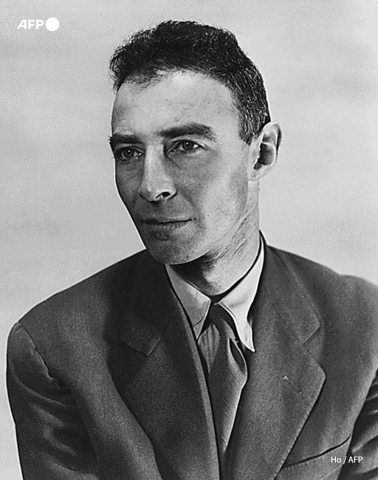Oppenheimer: Troubled 'father' of the atomic bomb

The nuclear blasts that destroyed Hiroshima and Nagasaki were the work of a group of exceptional physicists led by Robert Oppenheimer. He became a national hero but his brilliant mind was later beset by deep doubts regarding the moral implications of his achievement.
Widely considered the "father" of the atomic bomb, his future was put in jeopardy by his opposition to the development of the even more powerful hydrogen bomb and he later fell victim to a post-war hunt for communists led by Senator Joseph McCarthy.
Born in 1904 in New York city to a wealthy Jewish family, Julius Robert Oppenheimer studied first at Harvard and then with leading scientists in England and Germany. After returning to the United States, he taught at the University of California, Berkeley, and the California Institute of Technology (Caltech) and actively supported anti-fascist groups that were often close to the communist party.
Oppenheimer was acutely aware of the danger posed by the Nazis and of nuclear research under way in Germany under the direction of Werner Heisenberg.
In 1942 Oppenheimer was put in charge of a study on the feasibility of an atomic bomb, working with specialists such as Hans Bethe, Arthur Compton and Edward Teller. He played a leading role in building the bomb and, despite concerns over his political leanings, was placed in charge of the Manhattan Project in Los Alamos, New Mexico.
Described by fellow scientists as "a good soldier", the tall, austere physicist was the boss of several thousand people racing against the clock to build a weapon that would win the war.
- 'The destroyer of worlds' -
The bomb was built in about two years, as war raged in Europe and the Pacific. Some members of the team began to voice concern over the weapon's potentially terrible power of destruction but Oppenheimer pushed on and did not defend those whose political trustworthiness was in doubt.

After Germany surrendered, fierce battles were still being fought against Japanese forces and tens of thousands of US soldiers were dying on islands like Iwo Jima and Okinawa.
On July 16, 1945 the first nuclear device was detonated in the New Mexico desert and the so-called Trinity test brought home to Oppenheimer the power that he and his fellow scientists were about to unleash on the rest of the world.
Awed by the explosion, he quoted the epic Indian poem the Bhagavad Gita: "Now I am become Death, the destroyer of worlds."
After the Soviets tested their own atomic bomb in 1949, Oppenheimer opposed the development of a much more powerful hydrogen bomb and, in the climate of the Cold War, he became suspected of having communist leanings, especially in light of his relationships with communist sympathisers including his brother Frank.
A hearing was held to determine whether Oppenheimer should be allowed to conduct research within the US Atomic Energy Commission and his security clearance was withdrawn, ending any chance of continuing to work on military projects.
He was then named director of the Institute for Advanced Studies (IAS) at Princeton and, owing to president John Kennedy, was awarded in 1963 the Enrico Fermi prize, one of the highest US scientific distinctions.
Suffering from throat cancer, Oppenheimer died four years later at the age of 62.
A subsequent IAS director, Marvin L. Goldberger, said of Oppenheimer: "The country asked him to do something and he did it brilliantly, and they repaid him for the tremendous job he did by breaking him."
